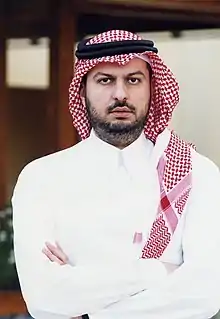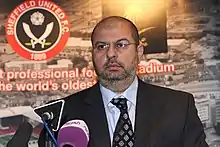Abdullah Bin Mosaad Al Saud
Abdullah bin Mosaad bin Abdul Aziz Al Saud (Arabic: عبد الله بن مساعد بن عبد العزيز آل سعود; born 19 February 1965) is the son of Prince Mosaad bin Abdul Aziz Al Saud.[1] He was general president of Saudi Arabia's General Sports Authority from 2014 to 2017.
| Abdullah bin Mosaad Al Saud | |||||
|---|---|---|---|---|---|
 Prince Abdullah c. 2013 | |||||
| Born | 19 February 1965 Riyadh, Saudi Arabia | ||||
| Spouse | Jawaher bint Fahd bin Abdullah Al Saud | ||||
| |||||
| House | Saud | ||||
| Father | Mosaad bin Abdulaziz Al Saud | ||||
| Mother | Fatima bint Hashim bin Turki | ||||
| Alma mater | King Saud University | ||||
He is the founder of United World Group, which holds entities such as Sheffield United, Beerschot, Al-Hilal United, Châteauroux, and Kerala United.
Life and education
His father is Prince Mosaad bin Abdul Aziz Al Saud and his mother is Princess Fatima bint Hashim bin Turki Al Nijris from the north-eastern Syrian city of Deir Al Zoar. Born in 1965 in Riyadh, Prince Abdullah moved with his family to study in Beirut and returned to Riyadh at the age of 10.
He has bachelors and masters degrees in Industrial Engineering from King Saud University.[2]
Business activities
In 1989 Prince Abdullah founded a paper manufacturing company in Saudi Arabia, the SPMC Group,[3] along with some partners. The company expanded its operations to include paper recycling and other related paper ventures and became one of the largest companies in the Middle East, with overseas interests. Prince Abdullah sold his interest in the company in 2016.
Prince Abdullah was the chairman of the leading Saudi Arabian Al-Hilal FC for 18 months between 2002 and 2004[4] during which time the club won the Crown Prince Cup. During his brother's chairmanship of Al-Hilal, Prince Abdullah supervised the club's investments. He remains a supporter of the club.
In September 2013, Prince Abdullah purchased a 50 percent stake in English then-EFL League One club Sheffield United and became co-chairman with Kevin McCabe.[5][6] In February 2018, Prince Abdullah entered into negotiations with McCabe to take full control of Sheffield United.[7] In September 2019, Prince Abdullah owned 100% of the club including all club-related properties (stadium, academy, hotel, etc.) after winning a legal case against his partner as per the High Court decision in UK. [8] In April 2021, Sheffield United announced that their chairman Prince Abdullah had resigned from his position for personal reasons.[9]
In mid-2018, Prince Abdullah controlled 50% of the Belgian football club KFCO Beerschot Wilrijk in the southern part of the city of Antwerp, and in January 2020 he increased his share in this club to 75%. Two years after Prince Abdullah took over Beerschot went on to win the league final in August 2020. The club was promoted back to the Belgian First Division. The club changed its name back to K Beerschot V Antwerp, its original name from the origin of the club.[10] The club also acquired the historic registration number "13" again. Around February 2020, it was announced that Prince Abdullah took ownership of the newly established Al Hilal United FC in Dubai, UAE.[11] In October 2020, Prince Abdullah became the owner of the newly formed Kerala United FC of I-League 2nd Division based in Calicut, India.[12][13]
In March 2021, it was announced that he has ownership of La Berrichonne de Châteauroux of the National division based in Châteauroux, France.

Career
In June 2014, Prince Abdullah was appointed General President of General Sports Authority in Saudi Arabia making him at the same time the head of the Saudi Arabian Olympic Committee, and the head of Islamic Solidarity Sports Federation. His tenure began on the 26 of June 2014 and ended on the 22 of April 2017. He was succeeded by Mohammed Abdul Malik Al Al-Sheikh. Later the Authority became a ministry.
Private life
Prince Abdullah married Princess Jawaher bint Fahd bint Abdullah Al Saud. He has five daughters and two sons.[2]
He is a fan of San Francisco 49ers.[14][15] A Fantasy Football player, a chapter in the book ”Wasting Your Wildcard”: The Method and Madness of Fantasy Football by David Wardale, is about Prince Abdullah.
References
- "The Prince Who Would Be Fantasy King". ESPN. 15 July 2008. Retrieved 4 September 2013.
- "The Paper Prince: Abdullah bin Mosaad Abdulaziz Al Saud". Campden FB. Retrieved 18 April 2017.
- "Saudi Paper Manufacturing Company". Arabian Business. 4 September 2013. Retrieved 4 September 2013.
- "Prince Abdullah lands Saudi youth role". The Sheffield Star. 28 June 2014. Archived from the original on 28 July 2014. Retrieved 28 June 2014.
- "Saudi prince buys 50% of Sheffield United". Arabian Business. 3 September 2013. Retrieved 4 September 2013.
- "Sheffield United: Prince Abdullah would do business with Bin Laden family". Sky Sports. Retrieved 10 April 2023.
- "Sheffield United: Prince Abdullah bin Mosaad bin Abdulaziz Al Saud in talks over buyout". BBC. 8 February 2018. Retrieved 9 February 2018.
- Dixon, Ed (17 September 2019). "Sheffield United ownership battle sees Prince Abdullah pay just UK£5m to take control". SportsPro. Retrieved 10 April 2023.
- National, The (17 April 2021). "Sheffield United chairman Prince Musa'ad steps down for personal reasons". The National. Retrieved 10 April 2023.
- "Beerschot Wilrijk ontrolt nieuwe structuur: 50% DCA, 50% Saudisch". Gazet van Antwerpen. 27 July 2018. Retrieved 22 February 2019.
- "عبدالله بن مساعد يعلن ملكيته لنادي الهلال يونايتد في الإمارات" (in Arabic). البيان. Retrieved 13 February 2020.
- "Indian football: Kerala's football passion gets the Sheffield United seal of 'approval'". Goal. Retrieved 20 November 2020.
- EPL side Sheffield United owners seal takeover of Indian club Calicut Quartz and rename it Kerala United FC spotik.in. Retrieved 15 April 2021
- "United secure new international partner". Sheffield United F.C. 5 September 2013. Retrieved 5 September 2013.
- Karen Elliott House, On Saudi Arabia: Its People, Past, Religion, Fault Lines and Future., New York, New York: Alfred P. Knopf, 2012, p. 123
External links
 Media related to Abdullah Bin Mosaad Al Saud at Wikimedia Commons
Media related to Abdullah Bin Mosaad Al Saud at Wikimedia Commons